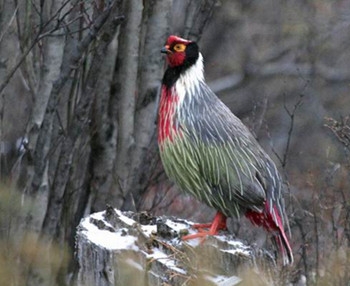(单词翻译:单击)

珍禽血雉
China's Native Pheasant
在陕西省西部,有一山高林密、生物资源丰富的太白山,海拔I 3, 767米,是秦岭山脉的主峰。我国特有的秦岭血雉就主要出产在这里,故又称太白鸡。
The Qinling blood pheasant, also known as the Taibai chicken, lives mostly I in the dense forests of the 3,767-meter-high Taibai Mountain—the main I peak of the Qinling Mountain Range.
秦岭血雉,形似家鸡而略小。雄鸟头部褐中杂灰,部分羽毛向后j 延伸成羽冠;下胸是鲜草绿色,尾羽因部位而异,有褐灰、绯红、灰_ 白、褐黑等多种色彩。雌鸟则以褐色为主。
The bird is a bit smaller than a chicken. The head of the male bird is covered with brown and gray feathers, which extend backwards to form a crest. Its [chest is grass-green and its tail varies from brown to crimson, grayish white, i and black. The female bird’s plumage is predominantly brown.
它们生活在高寒山区,常分布于海拔1,800-3,200米的针阔-混交林和针叶林中;结群性较强,少时6-8只,人冬则结成40-50只的大群;见人不惧,常在林间羊肠小道上昂首阔步。每年四月底至七月初是繁殖期,这时秦岭血雉筑巢于高山草丛或石洞中,每窝产卵6-8枚,孵化期29天。雏鸟出壳后,跟随亲鸟生活,直到冬天。血雉活动范围随季节变化而做有规律的迁移,不善飞行但奔跑疾速,夜间在树上过夜。它们的食物在夏秋是莎草科和禾本科的草叶、种子,忍冬的花朵,金背杜鹃的花以及蘑菇和少量昆虫等;冬春二季因冰雪覆 盖,以苔藓为主。
Qinling blood pheasants are usually found in the pine forests of the frigid alpine belt 1,800 to 3,200 meters above sea level. They move in groups of at least six or eight birds, and in winter a flock may have as many as 40 or 50 pheasants. They are not afraid of people, and sometimes they can be found strolling along forest trails. Mating season runs from late April to earlv July. The pheasants build their nests in alpine meadows or in caves, and after laying six to eight eggs, the female bird begins to brood for 29 days. The young birds live with their parents until winter, then the family makes its seasonal migration. The bird does not fly well, but it runs very fast. It sleeps in trees and feeds during summer and autumn on leaves and sedge or grass seeds, honeysuckle and azalea flowers, mushrooms, and a few insects. In winter and spring, when the alpine belt is icebound, it mostly eats moss.
秦岭血雉是我国珍贵的保护鸟类之一,羽毛美丽,可供观赏。 由于数量稀少,环境适应性差,目前国内外动物园中还未见饲养展出。
The Qinling blood pheasant is listed as a rare bird under special protection. Despite its beautiful plumage, the bird has never been displayed in zoos because of its scarcity and inability to adapt to new environments.
更多翻译学习资源,敬请关注可可英语。


